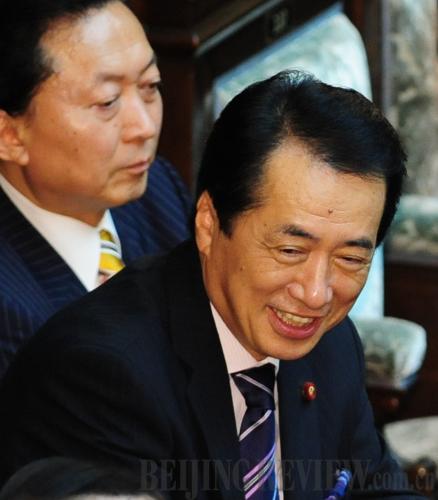|
 |
|
COURTESY OF WANG CHONG |
On June 2, Yukio Hatoyama stepped down as Japan's prime minister and leader of the country's ruling party, the Democratic Party of Japan (DPJ), eight months after its sweeping victory ended the long-time rule of the Liberal Democratic Party (LDP).
On the face of it, Hatoyama's departure resulted from his mishandling of U.S. refusal to relocate its marine base from Okinawa.
Hatoyama had vowed to enhance reciprocal relations with the United States. But his pledge was put to the test almost immediately after Washington refused to move the Marine Corps Air Station Futenma. Indeed, it proved a show of weakness, as Hatoyama campaigned on promises to close the base.
The base, with its noise and pollution, along with accusations of misconduct against U.S. marines, has long stoked anger among local residents. Hatoyama's appeals to close it, however, have proven fruitless: Washington will not budge.
 |
|
POLITICS PAST AND PRESENT: Japan's new Prime Minister Naoto Kan, seen at a lower house meeting on June 4 along with his predecessor Yukio Hatoyama (JI CHUNPENG) |
While both sides remain economically co-dependent, Washington has shown its ability to override Tokyo's domestic interests. If a Japanese political leader loses favor with the United States, his political career may be at risk.
For instance, the United States has conspicuously contributed to the downfall of a number of Japanese top politicians—including former prime ministers Kakuei Tanaka, Noboru Takeshita and Ryutaro Hashimoto. Small wonder, then, that Japan is often viewed as an "economic giant" while a "political dwarf."
The United States, however, is only part of the story. Hatoyama's economic policy offers a far more important reason for his resignation. While his bold cutting of government budget caused consternation among local officials, some of his reform measures hit a dead end because of vested interests.
In a time of economic stagnation, the public tends to prefer a tough foreign policy. That's why Hatoyama's perceived weakness over Futenma became the straw that broke the camel's back.
With the resignation of Hatoyama and the DPJ's Secretary General Ichiro Ozawa, the DPJ could have less chance of winning Japan's upper house elections in July. Consequently, uncertainties would continue to dominate Japan's political landscape.
Most notably, these might dash hopes for a "two-party system" in Japan. The LDP, which was founded in 1955 and led Japan to achieve a postwar revival and become the world's second biggest economy, has long called the shots. It had been in office over the past decades, except for a period of merely 10 months between 1993 and 1994.
The DPJ, founded in 1996, is the second largest political party in Japan. As a moderately conservative party, it stands for a democratic and stable political policy. It also calls for strengthened relations with other Asian nations—especially China.
The DPJ won a landslide victory in the 2009 legislative elections, giving rise to expectations Japan may move into a new era when two parties hold power alternately as in the United States. This optimism, however, has begun to ebb away with the abrupt departure of Hatoyama and weathered party leader Ozawa. This dramatic turn of events has brought the DPJ to a crossroads. Unless it recovers from recent setbacks as soon as possible, it might lose its hard-won power.
On June 4, Naoto Kan, former Deputy Prime Minister and Finance Minister, became Japan's new prime minister after being elected the new leader of the DPJ. As he takes over the reins of a recession-ridden Japan, he faces multiple challenges.
The ongoing Japanese recession is, in no small part, a continuation of the "lost decade" from 1991 to 2000, following the burst of the Japanese asset bubble. It was also fueled by the global financial crisis, coupled with an aging population.
Japan's ruling party has been committed to economic reforms since Junichiro Koizumi's administration, which lasted from 2001 to 2006. But difficulties have mounted as reforms go further. Like his predecessor, Kan is unlikely to turn things around.
Lacking experience in administration, moreover, the DPJ has proven unable to forge ahead with its reforms in a progressive style since taking office. Japan's conservative society has found its radical measures unacceptable. If it loses its majority in the upper house in the upcoming elections, it will surely face strong opposition from the LDP.
The bleak economic situation in Europe may take a toll on the Japanese economy, too, worsening the external environment for the DPJ.
Now that he can hardly bring about an economic recovery, Kan might go on to adjust Japan's foreign policy to court the United States more robustly. For instance, the new government could closely follow Washington's steps in addressing tensions on the Korean Peninsula.
By showing a hard-line stance, Tokyo could also improve its domestic approval ratings. In the same vein, it may get tough on the East China Sea territorial disputes as well. But it will not go too far.
The author is a guest research fellow with the Center for Japanese Politics at the Chinese Academy of Social Sciences | 